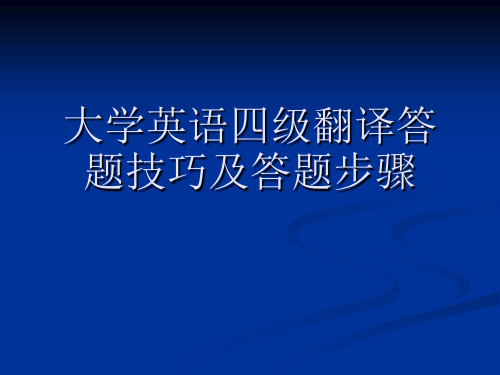四级考试翻译原则和基本方法
- 格式:pdf
- 大小:34.73 KB
- 文档页数:21


英语四级翻译方法与技巧
翻译英语四级需要一定的方法和技巧,以下是一些建议:
1. 理解上下文:在翻译过程中,理解上下文是非常重要的。
阅读整个句子或段落,了
解句子的语境和主题,这样可以帮助你更好地理解句子的意思,选择合适的翻译。
2. 学会转换语言思维:英语和汉语有很大的差异,要想准确翻译,应该学会转换语言
思维。
例如,一些英语表达中强调的顺序、逻辑和动作可能在汉语中需要重排或调整。
3. 学会使用同义词和短语:词汇和短语的选择是翻译中的关键。
学会使用同义词和短语,可以帮助你更准确地表达原文的意思。
多读多背常用表达,积累丰富的词汇和短语。
4. 理解文化差异:不同的文化背景会影响到翻译的理解和表达。
学习外国文化和习惯,可以帮助你理解原文的涵义,并将其准确地翻译为汉语。
5. 注意句法结构:英语和汉语的句法结构有所不同,翻译时要注意句子的结构和语序。
有时需要对原文进行重新构造,以使其更符合汉语的语法规则。
6. 注重细节和准确性:在翻译过程中,要细心地处理细节,并确保翻译的准确性。
注
意动词时态、名词单复数、代词的指代关系等方面的正确使用。
7. 多读多练:翻译是一项技术活,需要不断地练习和提高。
多读英语文章,多翻译练习,可以提高翻译的技巧和水平。
总之,翻译英语四级需要深入理解原文,掌握有效的翻译方法和技巧,不仅要准确传
达原文的意思,还要注意语法、词汇和文化的适应性。

翻译的评分原则及标准根据全国大学英语四级考试大纲公布样题的评分标准,英译汉部分每道题为2分。
其中,句子的整体语言结构占0.5分,另外句中还有三个必须翻译正确的语言点,每个语言点占0.5分。
基本上只要全句整体通顺,要点部分没有译错就可以得满分。
但最低限度不能偏离可以认可的译法。
但在2000年6月的修订中,其评分原则和标准有所变化。
为便于大家具体把握,现详述如下:1、本项目是通过翻译测试考生正确理解英文原文的能力。
2、本项目中的试题均摘自阅读理解部分的文章,因此“正确理解英文原文”是指必须根据上下文正确理解英文。
3、对译文的要求是“正确”和“表达清楚”,对汉语不作过高要求。
4、本项目满分为10分,其4题,每题2.5分;每题划分为3-4个给分段,分段的分值为0.5或1;凡分值为0.5者不再细化。
5、添加不必要的词语时,如不影响句义,不扣分;如影响句义,应扣分。
6、如译文与原文的句义相反,即使局部译对,全句也不给分。
补充说明:请特别注意第三条、第六条和第七条。
此外,在评分标准最后的注中,有这样一句话,也应当重视:有些会引起全句意思不当或产生岐义的错误,除局部扣分外,加扣0.5。
(这大约相当于原评分标准中句子整体结构的那句话,但仅指的是扣分,而不是给分)参考答案及评分标准:(划线部分每点一分)1. (Line 1-3, Para.1, Passage 1)Researchers have established that when people are mentally engaged, biochemical changes occur in the brain that allow it to act more effectively in cognitive areas such as attention and memory.研究人员证实人们在动脑筋时,头脑会发生生化变化,使头脑在注意力和记忆力这类认知领域中更加有效的活动。

英语四级翻译技巧英语四级翻译技巧大全导语大学英语考试大四级考试中的翻译题型也是以句子翻译为主。
考生如果能够熟练掌握句子翻译的基本方法,那么对于处理四级考试中的句子翻译题必将是如虎添翼。
以下是小编为大家精心整理的英语四级翻译技巧大全,欢迎大家参考!技巧一:增词法在翻译段落时,为了能充分的表达原文含义,以求达意,翻译时有必要增加词语来使英文的表达更加顺畅。
例子:虚心使人进步,骄傲使人落后。
译文:Modesty helps one to go forward, whereas conceit makes one lag behind.批注:中间加上了增连词whereas,以使英语的句子表达更加有逻辑性。
技巧二:减词英语的表达倾向简洁,汉语比较喜欢重复。
重复,作为一种汉语修辞方法,在某种场合下,重复的表达一个意思,是为了强调,加强语气。
为了有更强的节奏感和押韵,汉语中也经常会出现排比句。
考生在翻译这些句子时,为了符合英文表达的逻辑,就要有所删减或省略。
例子:这是革命的`春天,这是人民的春天,这是科学的春天!让我们张开双臂,热烈拥抱这个春天吧!译文:Let us stretch out our arms to embrace the spring, which is one of the revolution, of the people, and of science.批注:如遇到重复的汉语排比句,汉译英时记得遵守英语的逻辑表达,用定语从句来翻译,使英文句子读起来也朗朗上口。
技巧三:词类转换英语语言的一个很重要的特点,就是词类变形和词性转换,尤其是名词、动词、形容词之间的转换。
例子:她的书给我们的印象很深。
译文:Her book impressed us deeply.批注:在这里汉语中的名词需转化成英语中的动词"impress"。
技巧四:语态转换语态分为被动语态和主动语态,汉语中主动语态出现频率较高,而与之相反,英语中被动语态的使用率较高。

大学英语四级段落翻译技巧在经过英语四级改革之后,四级考试中的翻译部分从句子翻译改成了段落翻译,难度有所增加,下面整理了一些四级段落翻译技巧,希望对大家有所帮助!四级段落翻译技巧1在翻译前,先确定可以正确理解文章意思。
如:年夜饭译:The annual reunion dinner析:指过年的那顿团圆饭,每年一次。
所以在翻译时要表达出这个团聚的含义。
四级段落翻译技巧2中文没有过去式,但是英文有啊,前往别忘记翻译时态的转换如:我在第一段说过,我刚从大学毕业。
译: AsI said in my first paragraph, I was fresh from college.析:中文的时态是依赖一些汉字表达,英文根据动词的变化形式展示。
文中的“过”英文采用一般过去时翻译。
四级段落翻译技巧3有些介词可能会帮到忙,比如with+ 名词的结构,就很多见。
如:这里有许多山脉,生长着大片的森林,贮藏着丰富的矿产。
译: There are mountain ranges here with extensive forests and rich mineral resources.析:生长和储藏这两个动词在译文中并没有以动词的形式翻译,转译为英文的介词。
四级段落翻译技巧4应用英语的固定句型,这些句式可以加分,绝对是亮点如:是巴斯德发现了疾病是由活着的病菌引起的。
译: It wasPasteur who discovered that diseases are caused by living germs.析:此句应用了英文的强调句进行翻译。
四级段落翻译技巧5分析上下句之间的逻辑关系,添加一些简单的连词,英文的译文会更漂亮。
如:汽油贵得惊人,我们就很少用车。
译: Becausethe price of gasoline was fantastically high, we seldom used our cars.析:在原文中并没有出现表示原因类的词汇,但是在译文中根据两个句子之间的逻辑关系添加了表示原因的从句连词。

英语四级的翻译练习技巧翻译是英语四级考试中的重要部分,对于提高翻译水平,掌握一些练习技巧是必不可少的。
本文将为大家介绍一些英语四级翻译练习的技巧,希望能够对大家有所帮助。
一、积累词汇和短语翻译中词汇的积累非常重要。
学习过程中应该注重积累常见的词汇和短语,并了解其正确的用法和搭配。
可以通过背单词、阅读英语文章、听英语歌曲等多种方式进行词汇的积累,掌握一些固定的短语表达也能够提高翻译的准确性和流畅度。
二、提升阅读能力翻译的基础是阅读。
通过大量的阅读训练,可以提高自己的词汇量、理解能力和表达能力。
在阅读的过程中,可以注意一些典型的表达方式和句式结构,以便在翻译中能够准确地表达出来。
三、熟悉翻译的基本规则在进行翻译练习时,熟悉翻译的基本规则非常重要。
例如,要注意主谓一致,时态的正确使用,句子结构的调整等。
了解这些基本规则可以帮助我们更好地理解原文,并准确地翻译出来。
四、多做翻译练习题通过做翻译练习题可以加深对翻译技巧的理解和掌握。
可以选择一些经典的翻译练习题进行练习,例如翻译一些简短的对话、文章或新闻报道等。
在解答题目的过程中,要注意一些常见的错误和易错点,例如虚拟语气的表达、长难句的理解等。
五、背诵优秀翻译作品背诵一些优秀的翻译作品能够帮助我们更好地理解语言表达和翻译技巧。
可以选择一些优秀的翻译作品,例如翻译的名著、影视剧字幕等,背诵并模仿其中的翻译方式和表达方式,以提高自己的翻译水平。
六、多加练习口译口译是翻译的一种形式,通过练习口译可以帮助我们更好地理解语言的表达方式和习惯用法。
可以选择一些经典的英语演讲或对话进行模仿和练习,提高口译的流利度和准确性,同时也能够促进翻译水平的提高。
总结:通过以上的技巧和方法,相信大家在英语四级的翻译练习中能够取得更好的效果。
翻译需要耐心和毅力,并不是一蹴而就的过程,希望大家能够坚持下去,不断提高自己的翻译水平。
(文章字数:522字)。
英语四级翻译五大技巧
一、知识储备
首先要想办法提升和丰富自己的词汇量,这是翻译的基础,考生在翻
译时需要使用恰当的词汇来表达原文的意思,同时,考生也应该提升自己
的语法功底,以便更好的把握文意及表达原意。
二、正确理解原文
考生需要正确理解原文,才能翻译出原文的意思,因此,在翻译的过
程中,考生要耐心地去分析原文,把握原文的大意,并做到精准把握细节,以便更好的翻译出原文的意思,即使遇到不太理解的句子,也要认真思考,力求理解,而不要视而不见。
三、注重结构
在翻译的过程中,考生要注意把握语言的结构,这里的结构既包括原
文的结构,也包括翻译后的英文的结构。
考生应特别注意原文中句子的主
谓宾结构,若有意向的句子,也要注意把握其显性语义,一定要在翻译之
中保证句子的完整性,而不要缺失。
四、主次分明
在翻译的过程中,考生需要把握文章的主次,把重要的主要信息表达
出来,并及时表达次要信息,以便把原文的信息表达出来,同时,也要注
意把握不同的信息之间的顺序,以便更好的表达出原文的意思。
五、练习多样性
考生除了要把握好上述几个技巧以外。
大学英语四级翻译得分技巧在大学英语四级考试中,翻译部分对于许多同学来说是一个具有挑战性的环节。
但只要掌握了一些有效的得分技巧,就能在这一部分取得较好的成绩。
以下是为大家总结的一些实用的大学英语四级翻译得分技巧。
一、理解原文在开始翻译之前,务必仔细阅读并理解原文的意思。
这包括弄清楚句子的结构、词汇的含义以及上下文的逻辑关系。
如果对原文的理解出现偏差,那么翻译出来的内容很可能会离题万里。
遇到复杂的句子,不要慌张,可以先找出句子的主干,即主语、谓语和宾语,然后再分析修饰成分,如定语、状语等。
对于一些生僻的词汇,可以通过上下文的语境来推测其大致含义。
二、词汇积累丰富的词汇量是做好翻译的基础。
除了掌握常见的词汇外,还需要了解一些与中国文化、历史、社会等方面相关的特色词汇。
例如,“端午节”“京剧”“儒家思想”等。
平时可以通过阅读英语文章、背诵单词书以及使用单词记忆软件等方式来扩充词汇量。
在记忆单词时,不仅要记住其拼写和释义,还要了解其常见的搭配和用法。
三、语法正确语法是翻译中非常重要的一环。
要确保句子的主谓一致、时态正确、语态恰当等。
例如,在描述过去的事情时,要使用过去时态;在表达被动含义时,要使用被动语态。
同时,要注意一些常见的语法错误,如名词单复数错误、冠词使用不当、介词搭配错误等。
如果对某些语法点不太熟悉,要及时进行复习和巩固。
四、句子结构合理的句子结构能够使翻译更加清晰流畅。
在翻译时,可以根据原文的意思,选择合适的句子结构,如简单句、复合句或并列句。
对于长难句,可以将其拆分成几个简单的句子进行翻译,避免句子过于冗长和复杂。
同时,要注意句子之间的连接词的使用,如 and、but、so 等,使句子之间的逻辑关系更加清晰。
五、转换技巧由于中英两种语言在表达方式上存在差异,在翻译时需要进行适当的转换。
词性转换是常见的一种技巧。
例如,将名词转换为动词,将形容词转换为副词等。
例如,“重要性”可以翻译为“be important”。
大学英语四级考试翻译应试技巧一、评分标准汉译英部分有其详细的评分原则,了解这些评分原则对我们解答试题,取得高分有很大的帮助。
(1)整体内容和语言均正确,得1分。
(2)结构正确,但整体意思不确切、信息不全或用词不当,得0.5分。
(3)整体意思正确但语言有错误,得0.5分。
(4)整体意思完全错误,即使结构正确也不得分。
(5)大小写错误及标点符号忽略不计。
例如:Since mychildhood I have found that __________________ (没有什么比读书对我更有吸引力).(2006.12)1分 nothingattracts me so much as readingnothing but/other than/except reading can attract meso muchnothing can/could be so fascinating/inviting asreadingnothing is more appealing to me than reading books0.5分 there is nothingbut reading that can catch my attention (意思不确切)nothing was more attractive to me than reading (语言错误)there is no more attractive thing than reading (意思不确切)nothing is more interesting than reading (books)for/to me (意思不确切)0分 there is nothing than reading that is attracted me a lot (意思不确切、语言错误)nothing is more interesting than reading bookfor me (意思不确切、语言错误)nothing is more attracted to me thanstudy/studying/studies (意思不确切、语言错误)nothing can contract me more than reading books(整体意思错误)二、真题解析以下摘取的是四级新题型样卷及真题中的翻译部分, 我们先看一下2007 年12 月的考题。
l 翻译的原则
翻译界长期信奉的原则是“信”、“达”、“雅”三原则,但在四级考试中,对汉语没有很高的要求,所
以我们只要做到“信”和“达”就可以了。
当然,要做到这两点的根本是理解。
1. 理解第一原则
很多的“名师”很重视英译汉的技巧,以至于很多趋骛的考生过分侧重对翻译技巧的训练,而忽略
了翻译实际上是英文理解和英汉转换两个方面完美结合的过程。
而从以往四级英语考试的翻译试题来看,往往要求翻译的句子正是阅读短文中的难句、长句,评分的原则也是“对译文的要求是“正确”和“表达清楚”,对汉语不作过高要求”。
如果拿着翻译题就一味想着把英文往中文里套,却没有意识到自己
对原文的理解实际上就有偏差,这就很难得到理想的分数了。
因此,拿到翻译题之后,第一重要的是先确定原句的意思。
如果句子较长,可以先找主、谓、宾、定、状、补,分析清楚句子结构,然后再理解。
切忌逐字翻译。
从四级考试选择翻译句子的特点上来说,有点象是针对大学英语精读课文中的重点难点句子的解
析和翻译这一环节的测试。
因此大家在平常英语课学习时,要注意积极参与课堂的句子解析活动,多
分析复杂长句的结构。
这样,到考试时驾轻就熟,就很容易得分。
为了便于大家复习,下面总结了一些在大学英语精读课文中出现的长句,大家可以自己分析理解
一下。
然后,译为中文。
1. Taboo is a word from the language of the Fiji Islands that is used to describe something that
is forbidden
“禁忌”一词来自斐济群岛的语言,用来描述受到禁止的事。
“that is used to describe something that is forbidden” modifies “a word”.
2. Career planning includes gathering information about ourselves and about occupations, estimating the probable outcomes of various courses of action, and finally , choosing alternatives
that we find attractive and feasible.
择业规划包括备齐有关我们以及职业的信息资料,估计各种行动过程中可能出现的结果,最后作出我们认为有吸引力并且可行的选择。
3.Of course, complacency is appropriate for any decision in which nothing much is at stake, but
that does not describe career decisions
当然,对于那些不是厉害攸关的决策自满是可以的,但涉及职业方面的决策就不行了。
4.Society no longer attaches the stigma of “instability” to the idea of career hopping, as it once did.
社会已不再像过去那样把跳槽看作是“不安分”的事了。
5.The British Automobile Association, which is concerned with road safety, commissioned research into the relationship between serious accidents and music.
英国汽车协会关注道路安全,它委托进行了一次关于严重车祸与音乐关系的研究。
6. As well as the type of the music affecting road safety, the very fact that we have high-tech
music systems built into our car also causes accidents.
和影响交通安全的某种音乐一样,我们给车里安装高科技的音响系统这个事实本身也是引起车祸
的原因。
7. The distant sound of low voices, broken now and again by singing, reached Okonkwo from his
wives’ huts as each woman and her children told folk stories.
从小木屋里远远传来的低声细语,时不时地被歌声打断,奥康瓦听到了,这是他的妻子们同各自
的孩子在讲民间故事。
8. None of the birds had heard of this custom but they knew that Tortoise, in spite of his failings
in other areas, was a widely traveled man who knew the customs of different peoples.
鸟儿们谁也没听说过这个习俗,但他们知道,尽管乌龟在其他方面有很多缺点,他却到过很多地
方,知晓不同民族的风俗习惯。
in spite of 引导让步状语
9.Even top corporate managers, who have mostly affected styles of leadership that can be characterized as tough, cold and aloof, have begun to learn the lesson, and earn the benefits, of
writing notes that lift people up.
那些通常古板做作的公司高层经理们,其作风可以被形容为粗暴,冷漠,脱离群众。
甚至这些人
也开始学习写便函去鼓舞人心,且获益匪浅。
10.And knowing that this sort of marking can sting, I would of course write, onto the end of the
paper, something about how I know the student really tried hard, something about his rich imagination or potential for doing well.
由于我懂得这种批改的做法会刺伤他,我当然会在作文的最后写上诸如我是如何了解学生真的很
刻苦,他有如何丰富的想象力或他明显表露出的会写好作文的潜力等等。
11。
Sometimes I think that these modern fairy tales create as many problems for women as the
old stories that had us biding our time for the day our prince would come.
有时我觉得这些现代版童话故事给妇女带来的问题和那些使得我们总是等着王子的到来的古老的故
事一样多。
12.They also serve who stand and wait,” wrote the poet John Milton, but he forgot to add that they don’t get to be superwomen that way.
They also serve who stand and wait 相当于They who stand and wait also do service to the society ,其中who stand and wait 是they 的定语从句,被后置。
句中that way相当于in that way以那样的方式,文中指的是“站着等候”。
那些站着等候的人也在服务社会,诗人约翰弥尔顿写道。
但是他忘记了这些人站着等成不了女
强人。
2. 信的原则
所谓“信”,就是要忠实、准确。
翻译所要表达的是被翻译文章的观点和内容,因而难免会遇到译者不同意或不熟悉的内容和观
点。
但是译者没有选择的权利,必须按照原文的内容和观点来译,使译文忠于原文。
任何句子的翻译
都必须准确、完整的传达原文作者的思想内容。
译者不得对原文的意思做任何增删或改动。
例如:。